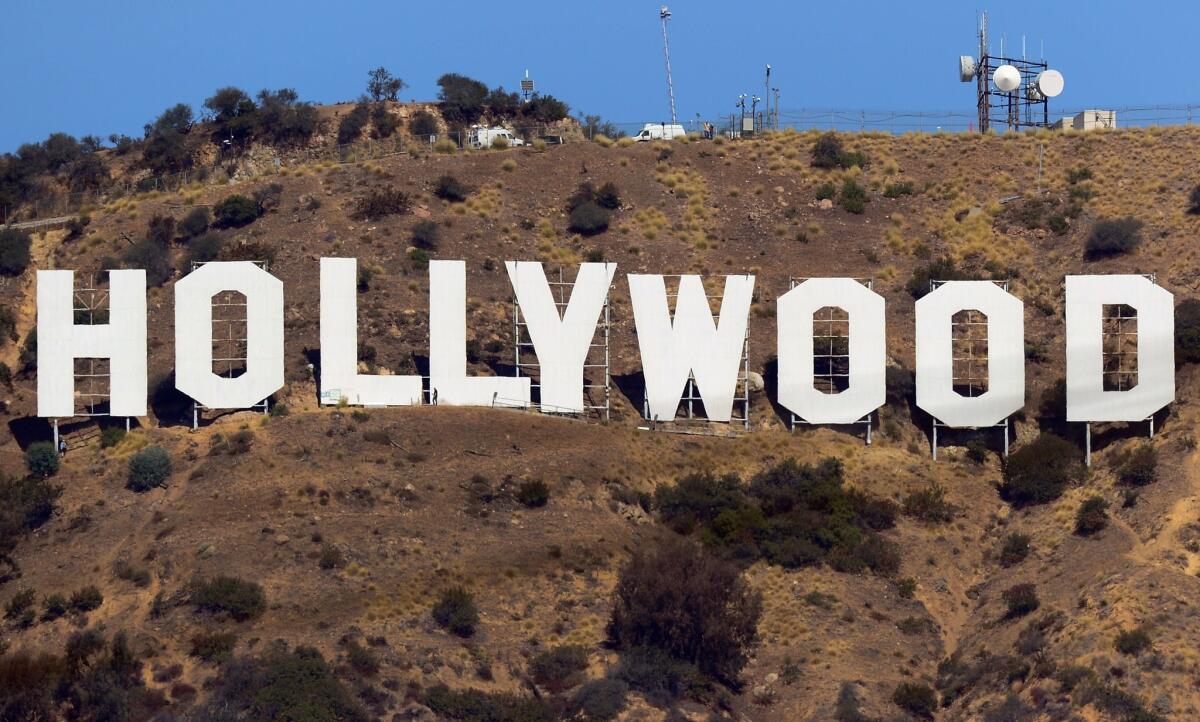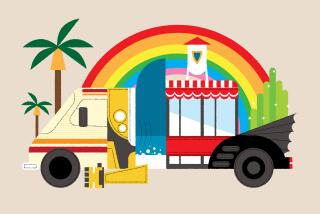Warner Bros. steps away from $100-million Hollywood sign aerial tramway

Movie and TV studio Warner Bros. has backed away from a proposal to build an aerial tramway to improve access to the Hollywood sign, the company said Thursday.
Warner Bros. in 2018 told Los Angeles city officials it would fund an aerial tramway to take visitors to and from the Hollywood sign, starting from a parking structure next to its Burbank lot.
The effort, dubbed the Hollywood Skyway, would have cost the studio an estimated $100 million. The tramway would have taken visitors on a six-minute ride more than 1 mile up the back of Mt. Lee to a new visitors center near the sign, with pathways to a viewing area.
Inside the business of entertainment
The Wide Shot brings you news, analysis and insights on everything from streaming wars to production — and what it all means for the future.
You may occasionally receive promotional content from the Los Angeles Times.
A benefit of the project would have been to alleviate traffic congestion in surrounding areas from tourists and visitors trying to get a glimpse of the famed sign. Traffic problems in residential neighborhoods, such as Beachwood Canyon, had worsened over the years with the rise of photo-sharing apps, ridesharing services and navigation tools such as Waze.
But concerns about safety and feasibility proved too much for the AT&T Inc.-owned movie and television studio, known for film franchises such as DC superheroes and Harry Potter.
“After exploring the challenging construction issues, required zoning changes and protocols necessary to protect guests during emergencies, we determined that our focus would be better placed on our core business interests,” Warner Bros. said in a statement. “We know there are other solutions being explored to provide access to the iconic Hollywood sign and address neighborhood congestion. We look forward to seeing those come to fruition for the citizens of Los Angeles and the millions of tourists eager to visit the sign each year.”
Despite big ambitions, the 97-year-old studio faced major challenges when it came to putting its plans in motion, according to a person familiar with the matter who was not authorized to comment.
For example, Mt. Lee is a high-fire area in a state where wildfires burned 4 million acres in 2020. The development would also be vulnerable to earthquakes and other natural disasters.
The project would have required the studio to build into a mountain. It also would’ve needed two exits to ensure guest safety, and it wasn’t clear whether that would be possible because one of the exits would have been down the mountain’s face.
Other factors were land ownership and use, considering the location is adjacent to a famous cemetery and parkland. The required environmental impact report and feasibility studies would have added hurdles as well.
Warner Bros.’ corporate mandate has shifted since it was purchased by AT&T as part of the Dallas phone giant’s $85-billion Time Warner acquisition in 2018.
AT&T and WarnerMedia (renamed from Time Warner) have focused much of their attention on building HBO Max, the streaming service it launched in May. A significant part of Warner Bros.’ business is now geared toward producing movies and shows for the streamer, which is the media giant’s priority.
The tramway project was championed by Jon Gilbert, the Warner Bros. facilities head who retired early last year.
“This requires a bold solution,” Gilbert said at the time. “If we really want to make a difference ... it’s got to be something compelling. Partial solutions are not going to do the trick, and people will continue to inundate the neighborhoods.”
Easing access to the sign could have helped lure more tourists to Warner Bros., which in 2015 invested $13 million to build a new set of interactive attractions on its Burbank lot to increase its chunk of L.A.’s tourism business. Warner Bros.’ popular studio tour has been closed due to the COVID-19 pandemic.
The idea of an aerial tram to the Hollywood sign has been floated numerous times over the years as a way to draw tourists away from the residential areas and raise revenue for the city. Mayor Eric Garcetti revived the concept in May 2017, saying a gondola could come from the Universal Studios Hollywood area.
The mayor’s office did not immediately respond to a request for comment.
More to Read
Inside the business of entertainment
The Wide Shot brings you news, analysis and insights on everything from streaming wars to production — and what it all means for the future.
You may occasionally receive promotional content from the Los Angeles Times.











